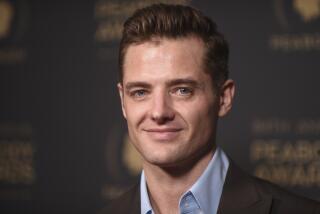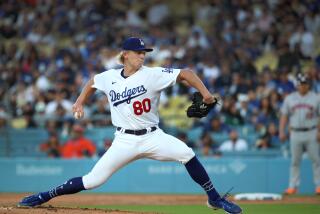THE ROGERS’ NEIGHBORHOOD : Veteran Thurlow Rogers Develops a Companion in Competitive Cycling--His Younger Sister Dara
- Share via
More than five years have passed since the afternoon Thurlow Rogers nosed his bicycle through a patriotic mob of flag-wavers in Mission Viejo. The crowd stirred, then rose and roared its greeting to the 24-year-old cyclist and his fellow 1984 Olympic team members.
On a training ride, the cyclists had inadvertently discovered the trail where the Olympic torch was to pass from the opposite direction and, dressed to the hilt in their new red, white and blues, they became the object of a small-scale nationalistic celebration.
The Olympic moment and the subsequent Games touched Rogers like nothing in cycling had before, or would again.
Not his 1983 Pan American Games bronze medal; not the time in 1986 he spent with La Vie Claire, the French team magnifique that sponsored the likes of Greg LeMond, Bernard Hinault and Andy Hampsten.
“Nothing’s come close,” said Rogers, a 1977 graduate of Kennedy High and a Van Nuys resident. “There’s no doubt about it. Racing down in Mission Viejo with half-a-million people screaming for you the entire time. . . Nah, nothing’s come near it.”
Rogers, 29, said those words with a whimsical smile, with not a trace of regret. He does not speak like a man who considers his present caged by his past.
Instead, he refers to changing focuses, novel challenges and riding for the sheer joy of it--in much the way his younger sister Dara did all along.
Also a competitive cyclist, Dara is the first to recognize the difference between herself and her brother. “We kind of went different routes about it,” the Louisville High graduate said. “Thurlow went right after racing and I did it as a social thing. It was training, but not high-pressure stuff.”
Stuff like the 1984 Olympics, of which Eddie Borysewicz also holds memories. Eddie B., as he is known to the world cycling community, was the United States’ Olympic cycling coach for 10 years, including in 1984.
Eddie Borysewicz also has his memories of that year. Eddie B., as he is known to the world cycling community, was the United States’ Olympic cycling coach for 10 years, including in 1984.
He remembers the nine medals, America’s most lucrative haul ever, and the cyclists who took them home. And he recalls one in particular who did not take a medal with him--Thurlow Rogers.
“Thurlow was the best amateur rider in America in 1984,” Borysewicz said. “He wasn’t the fastest, but he was the strongest.
“In 1984, he was the man who worked hardest on the (Olympic) team.”
Steve Hegg, who won a gold and a silver medal as a track racer that year and now is a teammate of Rogers’ with the Montgomery/Avenir team, said Rogers is, “Better than any other team rider I’ve ever been with.”
That is not to suggest Rogers does not cycle for the simple joy of winning. Victory, after all, has its advantages as well.
“It’s the way to get the maximum benefit out of the race,” Rogers said. “If everyone rides smart and for one another, you get the best team results. In a perfect world, everything works out great.
“I would prefer to win the race, though.”
After a successful amateur career in which oftentimes he did exactly that, Rogers turned professional in 1986 and joined La Vie Claire without so much as a thought of the Olympics two years hence. He was the second American, behind LeMond, to sign a professional contract to ride with a European team, according to Borysewicz.
“When I had the opportunity to turn pro in ‘86, it was like turning pro for the Yankees in baseball or the Dodgers. It wasn’t like turning pro for some little team that was nowhere,” he said. “It was the top. The nicest, biggest, cleanest organization that was run.”
LeMond that year became the first American to win the Tour de France, cycling’s answer to the World Series. Rogers, however, was not part of that race. La Vie Claire, he said, “Was plenty strong and didn’t need me.”
By that time, Rogers had decided that the structure and life style of European racing was far from its glamorous stereotype. He trained in the snow, ate when and what they told him to.
“You’re a total slave,” he said, “and I didn’t want to do that anymore.
“A lot of guys, that’s their big ambition. They want to turn pro and ride in Europe. It wasn’t really mine. I wanted to make the (1984) Olympic team and do that. I thought, probably, that I’d do that and quit. But it’s too much fun, you know?”
Too much fun? That doesn’t sound like the words of a European racer. Sounds more like someone like, well, Dara.
Dara is 26. She works full time at Cedars-Sinai Hospital in the field of nuclear medicine, which involves diagnostic testing with radioactive material. She also is a cyclist.
Dara won three events in the District 3 Championships in June--the individual pursuit on the track and the individual time trial and road race. At the same time, incidentally, Thurlow was second in the men’s road race and his wife, Karen Roy, won the veteran women’s road race.
Women’s racing, however, has not reached the heights of its men’s counterpart. Quality teams and generous sponsors are rare, which makes Dara’s new-found dedication to the sport more difficult. She is gathering information for her resume, which this season has been bolstered by impressive showings in the road and track National Championships and various other events, and invitations to the Olympic Trials in 1984 and ’88. It could land her a position on one of the few recognizable teams, to which she would bring a veteran racer with solid cycling genes.
Dara estimated that there are 25 women who make their livings as cyclists. Perhaps there is room for another.
“Going to Nationals and seeing those girls, they didn’t seem that much better,” she said. “They were not a quantum leap ahead of everyone else. I thought if I raced with them, I could be very competitive. And if I wait any longer, I really will be over the hill.”
With the racing season slowing for Montgomery/Avenir and Dara concentrating primarily on races close to the Los Angeles area, Thurlow and Dara have had a chance to coordinate the occasional training ride. It is a luxury they could not always afford. Dara studied at UC Santa Barbara and Thurlow seemed to always be traveling with a team.
“I may have encouraged her a little bit,” Thurlow said. “But what she did she did on her own because I was off racing at the time. The times she decided to go hard, she did really well.
“And she goes out and has a good time.”
Said Dara: “Thurlow was devoted. He gave up a lot to race. Not like me--wishy-washy. It’s not the same intensity that he does.
“He’s got the killer instinct, I think. He definitely has to be the best.”
That was the drive that led to Rogers’ Pan American gold, Olympic team berth, European contract and then positions with various prestigious teams. The focus, however, has changed. Because of Rogers’ longtime professional contracts (he since has regained his amateur status) his career course is no longer directed toward concrete payoffs like the Olympics.
“It’s definitely more difficult now,” he said. “I don’t have the real obvious goal and the easy steps that you knew ahead of time. Granted that system had a little more pressure. Here, since what I’m doing is more spread out through the season, it’s more difficult to focus.”
Rogers is the team captain for Montgomery/Avenir, which is coached and managed by Borysewicz, Rogers’ amateur coach. Rogers does not look to Borysewicz like a man searching for focus.
“Thurlow is a very good example, a good man,” he said. “He shows riders how to ride as a team. He is our main man on the road.” Rogers can find solace in that--even five years removed from his greatest cycling moment. Especially after five years.
More to Read
Go beyond the scoreboard
Get the latest on L.A.'s teams in the daily Sports Report newsletter.
You may occasionally receive promotional content from the Los Angeles Times.






